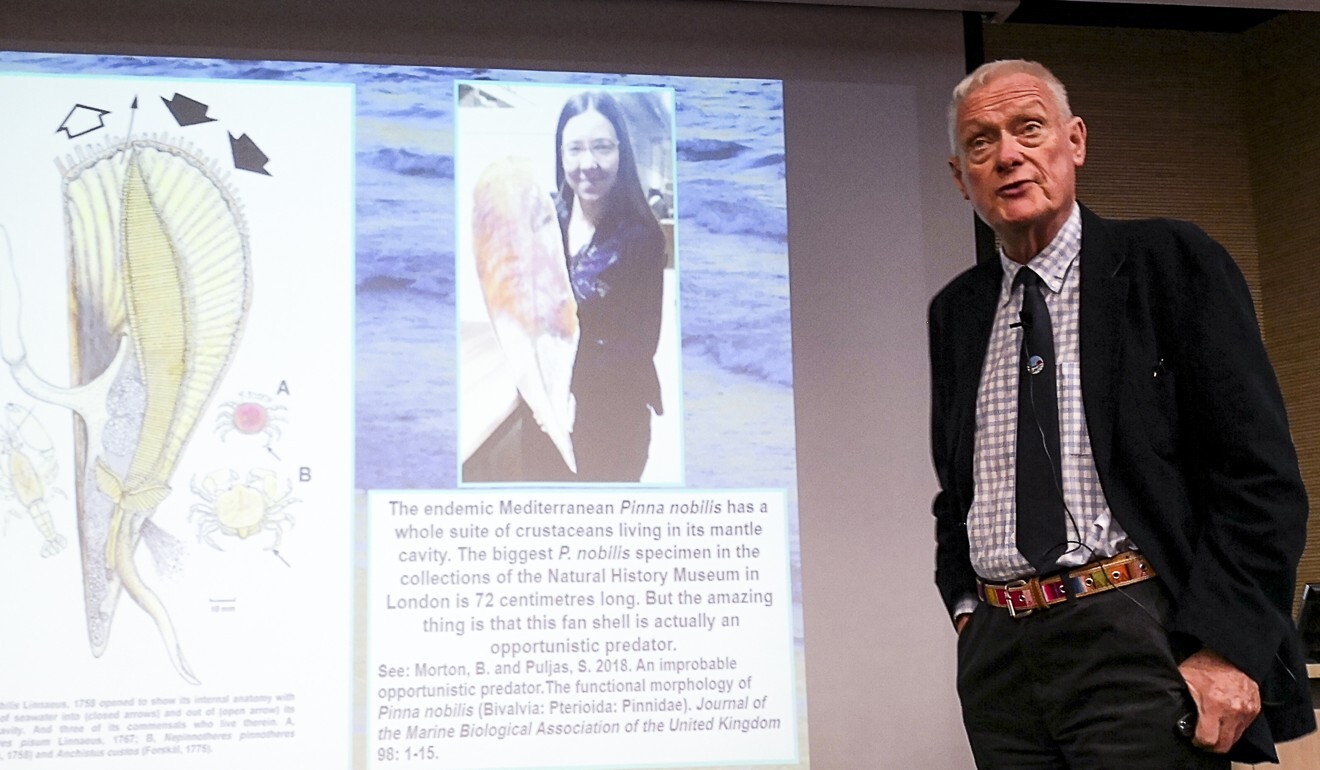
‘Father of ocean conservation’ Brian Morton inspired many in Hong Kong to protect marine environment, animal habitats
- For more than 20 years, British expert led the push for marine parks, reserves in Hong Kong
- Former students, colleagues planning memorial for tireless conservationist who died, aged 78
Students meeting marine ecologist Brian Morton for the first time in class at the University of Hong Kong were often surprised to see their professor dressed casually in shorts and flip-flops.
He was informal, approachable and did not like being called “professor”. But Morton, who died in Britain in March aged 78, was one of Hong Kong’s most important conservationists and inspired dozens of scientists to work on protecting the city’s marine ecosystem.
“Calling Brian the ‘father of ocean conservation in Hong Kong’ is absolutely the most fitting way to describe him,” said Dr Leung Siu-fai, director of the Agriculture, Fisheries and Conservation Department (AFCD) and a former student.
Morton spent more than three decades teaching ecology and biodiversity at HKU before he retired in 2003. He led the push for marine parks and reserves, and founded the Mai Po nature reserve in Yuen Long, HKU’s Swire Institute of Marine Sciences in Cape D’Aguillar and WWF-Hong Kong’s Hoi Ha Marine Life Centre.
“When he first came to Hong Kong, there were few records of marine organisms and the ecosystem here. He was one of the first to really build up this field of research and start teaching it in the city,” said Leung.
In the decades after Morton arrived in the 1970s, Hong Kong saw rapid development, including extensive reclamation that affected the habitats of marine animals. Pollution became a problem too, with plastic waste clogging waterways and beaches.

Morton first identified the need for marine parks and reserves to protect the city’s coastlines and marine health.
He returned to England after he retired and died at home from a lung disease, leaving his partner and four children.
His former students and colleagues, who are planning a memorial ceremony in Hong Kong next month, credit him with inspiring their passion for marine biology.
Dr Patsy Wong, a former senior fisheries officer at the AFCD who now lectures part-time at HKU, said: “When I first entered HKU, I had never thought of studying marine biology. I couldn’t even swim.”
Maritime Museum to be expanded to promote marine and environmental awareness
That changed after she took a summer job with Morton in 1971 to help conduct a survey of organisms along Hong Kong’s stony beaches.
“He was very easy to get along with and disliked us addressing him with formal titles,” she said. “He made the research very interesting and widened my horizons.”
Hardworking and curious, Morton would send samples of any species he did not recognise to experts abroad for identification. Thanks to his efforts, “nearly 90 per cent of species” in Hong Kong have been identified, Wong said.
“He really was a pioneer,” Wong said.

Professor Kenneth Leung Mei-yee, director of the State Key Laboratory of Marine Pollution at City University, said Morton was the first to discover the Hong Kong oyster, Crassostria honkongensis.
“This type of oyster is more tolerant of low water quality and kind of symbolises Hongkongers’ ability to live in odd situations,” said Leung, who is also chairman of the Marine Parks Committee. “Even though it is spread across the entire Pearl River Delta, it was discovered here, so Morton named it after the city.”
Morton’s efforts over nearly two decades led to the first batch of marine parks and reserves being established in 1996. Hong Kong now has six marine parks.
“He was a visionary leader, he deeply understood that the density of Hong Kong’s population would lead to a lot of pollution if we could not speed up legislation to protect the marine habitats,” Leung said. “He was determined to build the marine parks and put his whole heart into it.”
Why Hong Kong’s remarkably diverse marine ecosystem is in peril
Morton also made an impact among environmental activists, helping to start World Wide Fund for Nature (WWF) in Hong Kong.
“Working in conservation is really difficult, but he taught us to stick to our principles and beliefs,” said Nicole Wong, WWF-Hong Kong’s director of corporate affairs, who worked with Morton to establish the Hoi Ha Wan Marine Life Centre.
Professor Joe Lee Shing-yip, another former student and now director of Chinese University’s Marine Science Laboratory, said Morton’s legacy was “bigger than just one person”.
“We need characters like him now more than ever as environmental issues become more complex,” he said. “Hong Kong still has a lot more worth doing and I hope environmentalists have his determination to continue fighting for what is right.”

